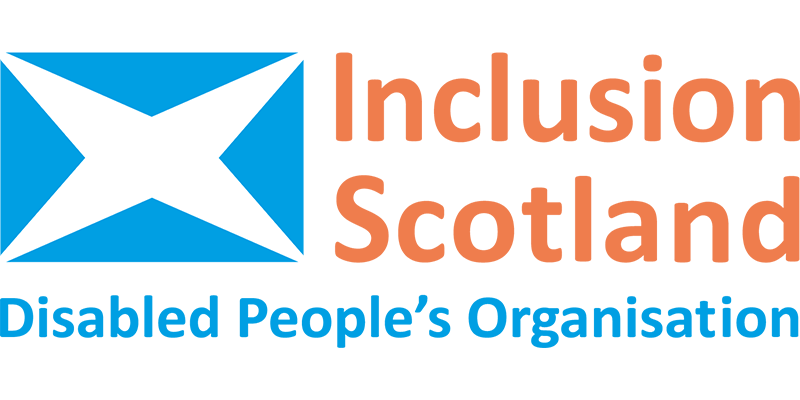
Inclusion Scotland
The cost of living crisis has squeezed the incomes and reduced the quality of life for households across Scotland. The truth is of course that this crisis, much like the pandemic, simply exposes the pre-existing inequalities in our society.
During such an emergency, anti-poverty campaigns compete for the attention of policymakers who claim they are unable to respond adequately to everybody’s needs.
The poverty of disabled people – which is longstanding and entrenched - is easily ignored. It exists mostly behind closed doors: Socially isolated, politically marginalised, digitally excluded, and physically barred from public space, the experiences of most disabled people are hidden. It is challenging for disabled activists and our organisations to shine a light on the scale of the problem.
The facts are worth repeating, and should not lose their impact: According to poverty and inequality data published in March 2023, In 2019-22, just over half (51%) of people in relative poverty after housing costs lived in a household where someone is disabled.
According to Scope’s latest research, “On average, disabled households (with at least one disabled adult or child) need an additional £975 a month to have the same standard of living as non-disabled households. If this figure is updated to account for inflation over the current period 2022/2023, these extra costs rise to £1,122 per month”.
We should be clear that these “additional costs” are the financial penalty for being disabled by a society that does not invest in the rights, health, or well-being of those living with impairments.
For example, many disabled people spend a substantial proportion of their own income securing the personal and social care support that allows them to be included in society and participate as full and equal citizens. In March 2023 one Scottish Local Authority set a taper for non-residential care which left many disabled people with just 25% of their income (after housing costs) to survive on, despite rising food and energy costs.
In addition, energy costs are disproportionately high for disabled people who may need to keep their homes warmer or cool enough in order to manage pain and mobility as well as higher electricity costs to run vital health equipment such as ventilators and food pumps. Being unable to run independent living equipment such as stair lifts, hoists, power wheelchairs, and communication devices is a threat to human rights.
Disabled people’s poverty is embedded in structural inequalities, social attitudes, and the persistent failure of policies and services to meet disabled people’s needs. The current cost of living crisis comes after more than a decade of austerity that has already eroded the safety net for disabled people, a pandemic response that did not prioritise our human rights, and an approach to economic recovery that does not value us.
It is not good enough to say that these steps cannot be taken because we are in crisis mode. A strategic and preventative approach must be taken now.
That’s why Inclusions Scotland’s calls for action are designed to deal with the long-term drivers of disabled people’s poverty as well as the current crisis. It is not good enough to say that these steps cannot be taken because we are in crisis mode. A strategic and preventative approach must be taken now.
Such actions, which could be taken by various levels of government, and which take a cash-first, rights-based approach, could include…
- Implementing an Energy Subsidy Scheme so disabled people can run the equipment provided to them by the NHS
- Reforming the system for benefit uprating so that disabled people don’t wait 8 months for their incomes to chase prices
- Allocating an additional cost of living payment so that disabled people’s payments match those of non means tested pensioners
- Doubling the Winter Heating Payments as the majority of households in receipt include disabled people
- Reinstating additional cost disability benefits as a qualifying entitlement for the Warmer Homes Discount
- Widening the eligibility for Adult Disabled Payment by scrapping the 50% and 20 metre rules
- Scrapping social care charges
- Reopening the Independent Living Fund
- Building accessible and affordable homes
- Supporting employers to recruit and retain disabled people
- Tackling the disability pay gap through a human rights based fair work strategy
- Investing in money advice services
- Halting the collection of public sector debts
… and much more besides.
With all these options available, some progress must be possible. Instead, one disabled person told us at Stacked Against Us conference that: “We’ve got a government that doesn’t give tuppence about any of us.”
Listening directly to the experiences of disabled people is crucial, and collating this testimony is a heartbreaking task. As early as Autumn 2022, disabled people responding to our cost of living survey were painting a picture of the unacceptable decline in living standards.
Disabled people talked of staying in bed all day in cold houses to try and stay warm, going without baths and showers to save money, cutting back on social care support they pay for like help to cook, wash themselves or socialise, or going without paid for medication like painkilling injections.
the only thing that comforts me is knowing I can use the medication I’ve stockpiled in order to bring this to an end.
Many participants spoke of the impact the cost of living crisis has had on their physical health, with several mentioning chest infections and other illnesses related to cold, damp homes. Others mentioned how their existing health conditions have been made worse, including deterioration in mobility, increase in pain, and avoidable hospitalisations.
One person explained that they were “worried about dying alone freezing, hungry. Knowing it was avoidable”, while another shared that: “I won’t be able to survive. My bills are already double what they were and the only thing that comforts me is knowing I can use the medication I’ve stockpiled in order to bring this to an end.”
By March of this year, participants at our conference were saying that: “I know a good friend who deteriorated before our eyes and died because of this cost of living situation.” And another said that: “I know some disabled people who have left themselves to die as they couldn’t face anymore. It is shocking.”
And they are right. It is shocking. As put so effectively by Emma Jackson in a previous Poverty Alliance guest blog, “We must never become desensitised to the injustice of poverty and the relentless cruelty it perpetuates.”
We are not building back better. This cannot be the “new normal”. Massive intervention is needed now, because disabled people’s poverty is not inevitable.


Enter your email address to receive regular e-updates about our work. If at any time you want to stop receiving these, simply contact us. We’ll keep your details safe and won’t share them with any other organisations for their marketing purposes. For full details see our Privacy Policy.